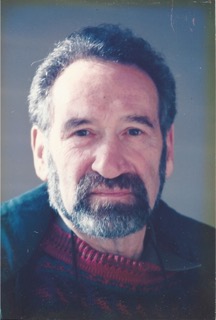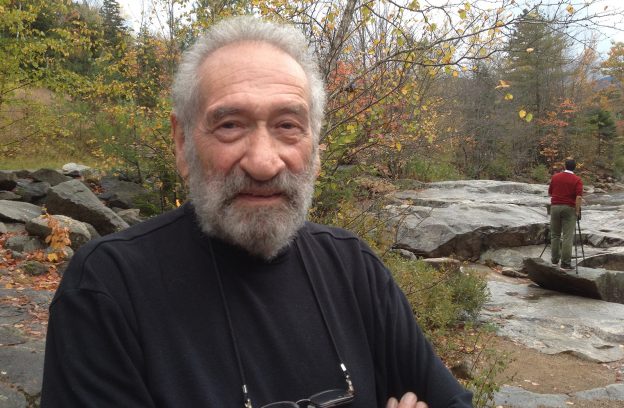A dear friend, colleague, mentor, role model. A man of incomparable warmth, intelligence, gentleness and wit. To see him interact with people with such generosity and joy, as we did on shoots far and wide, was a lesson in how to be better human being.
Below are Dick’s bio as it appeared on the Telequest website while he was still active with the company, and an obituary provided by his widow Scotia MacRae:
DICK BLOFSON
Besides directing and producing many of Telequest’s projects, Dick Blofson is most often the man behind the camera.
Recently he could be found capturing the action in an office building in Osaka, recording the wildlife in the rain forest of Costa Rica, and hanging off a fire engine racing through the streets of Trenton, New Jersey.
He was the cinematographer for The Line King, produced by the New York Times and nominated for Best Documentary Feature during the 1997 Academy Awards.
Before co-founding Telequest, Dick produced documentaries with partner Scott Nielsen and worked as a freelance director, cameraman and production manager for CBS, ABC, WNET, and other broadcast outlets. Dick’s sense of story and drama is rooted on Broadway, where he spent 12 years as a stage manager on productions with Paul Newman, Katharine Hepburn, and Barbra Streisand.
Dick is a graduate of Antioch College, and served three years in the U.S. Navy.
Richard Stephen Blofson, Obituary

1933-2020
PLAINSBORO, NJ—Princeton resident Richard Stephen “Dick” Blofson, a Broadway production manager and New Jersey filmmaker, died peacefully on September 3, 2020, of complications of non-COVID pneumonia at the University Medical Center Princeton in Plainsboro, NJ. He was 87 years old. Born in Philadelphia in 1933, Blofson graduated from Central High School.
As stage manager of Michael Todd’s blockbuster 1957 party at Madison Square Garden to celebrate the premiere of the film Around the World in 80 Days, he cued Marilyn Monroe’s entrance on an elephant. Blofson remembered that someone presented Elizabeth Taylor, Todd’s wife at the time, with a raccoon. “Here, take this,” she hissed at Blofson as she exited the stage. He also said he never saw so many rich people argue so vociferously over glasses of cheap champagne. The New York Times in 1999 called the event one of the “10 Parties that Shook the Century.” Although it was perhaps the most prominent production he worked on, it was not the one of which he was most proud.
Blofson’s career started when he was a student at Antioch College majoring in anthropology and creative arts, spending half the year in Yellow Springs, OH, and half the year in New York City working at the Phoenix Theatre. The director Arthur Lithgow (later artistic director at McCarter Theatre in Princeton) was his mentor at Antioch and deepened Blofson’s lifelong appreciation of Shakespeare. Among the many shows Blofson worked on at the Phoenix were The Golden Apple (1954), the first off-Broadway show to win the Best Musical Award from the New York Drama Critics’ Circle; and Once Upon a Mattress with Carol Burnett (1959); both went on to Broadway. In 1955, he worked with Bernard Gersten on the New York City Center production of Guys and Dolls, starring Walter Matthau.
At the American Shakespeare Festival in Stratford, CT, Blofson worked on a number of productions, including a 1957 tour of Much Ado About Nothing with Katharine Hepburn and Alfred Drake, directed by John Houseman. During the tour, Hepburn paid for Blofson’s transportation back to New York to spend time with his infant son, who had a medical issue.
He was the stage manager for Barbara Streisand’s Broadway debut production, I Can Get It for you Wholesale (1962), in which Elliott Gould also played; for the gospel musical Tambourines to Glory (1963) by poet, author and playwright Langston Hughes; for Strange Interlude (1963), directed by Jose Quintero, with actors Jane Fonda, Franchot Tone and Ben Gazzara; and Baby Want a Kiss (1964) with actors Paul Newman and Joanne Woodward.
Other artists he worked with include actors Jean Arthur, Richard Boone, Katherine Cornell, Richard Easton, Merv Griffin, Eliot Feld, Carol Lawrence, Nancy Marchand, Roddy McDowell, Geraldine Page, Jason Robards and Fritz Weaver, as well as directors Sidney Lumet, Arthur Penn and Ed Sherin; and playwrights Tennessee Williams and Sean O’Casey.
An inveterate traveler, he then embarked a freelance career as a camera operator for CBS, ABC, WNET and the USIA that took him to Turkey and many countries on the African continent. For the USIA, he followed tennis players Arthur Ashe, who was Black, and Stan Smith, who was white, during a series of exhibition games in various countries in Africa. Ashe was the firstBlack American male to win a NCAA tennis championship, the first to win a Grand Slam Title, and the first to represent the United States in the Davis Cup; Smith was a World No. 1 American tennis player and two-time Grand Slam singles champion.
For CBS, Blofson followed candidate and former Vice President Richard Nixon in the 1968 film version of The Making of the President. He also filmed productions for the National Theatre of the Deaf with his former Broadway colleague, lighting designer David Hays.
In 1968, Blofson and filmmaker Nigel Noble formed Arden Productions. Several years later, he and Scott Nielsen cofounded The Production Staff, succeeded in 1977 by Telequest Inc., which specializes in documentary films. Among the productions for WNET were Clash of Cultures,which won a Cine Golden Eagle and a Eudora Welty American Award. Two of 16 animated shorts, made for the CBS program Captain Kangaroo won, respectively, a Silver award at the Houston International Film Festival and a Best Children’s Program award for animation sequence.
Director and cameraman for the New York Times History Project, Blofson worked on three films: Abe, about the career of the former executive editor Abe Rosenthal, who presided over the publication of the Pentagon Papers; Reston, about James “Scotty” Reston, the Pulitzer-Prize-winning journalist who had been executive editor and columnist at the Times; and Hirschfeld, a celebration of the 85th birthday of Al Hirschfeld, caricaturist for the theatre section of the New York Times, whose hidden tributes to his daughter Nina were eagerly sought after by his followers. The footage was developed into The Line King, a full-length documentary written and directed by Susan Dryfoos, that was nominated for an Academy Award.
Telequest went on to make a series of documentaries for WNJN, Harvard University, Princeton University, independent schools and various nonprofit organizations, including the Arts Council of Princeton, the Princeton Public Library, Womanspace of Mercer County, and a number of organizations based in Trenton, NJ, including the Children’s Home Society, and Isles. The company also made a pro-bono film called Before You Enlist to provide young people and their families a more complete picture of the life-altering consequences of joining the military, especially in wartime.
During the Korean War, Blofson served in the U.S. Navy on the USS Putnam. A member of the Actors Studio and the Actors Equity Association, among other organizations, he lived in New York from the 1950s until 1988, when he moved to Princeton. After he retired from Telequest, he came out from behind the curtain and the camera to become a player in Onstage Seniors (McCarter Theatre), whose members create and act short documentary stories collected from community members.
He is survived by his wife, Scotia MacRae, his son Tony Blofson from his marriage to Betty Hellman (which ended in divorce), wife Denise Paasche and grandsons Caleb and Pete Paasche; his daughters Kate Blofson (Thomas Case) and Beth Blofson (Ben Dickey), both from his marriage to Eleanor Harter Ruma (who died in 1982), and stepdaughter Aurora MacRae-Crerar (Vinayak Mathur). He was predeceased by his sisters Lorraine Blofson Brown and Jane Blofson Rudofker.Contributions in Blofson’s honor may be made to the Arts Council of Princeton (www.artscouncilofprinceton.org), Friends of Princeton Open Space (www.fopos.org) or Veterans for Peace (www.veteransforpeace.org).

